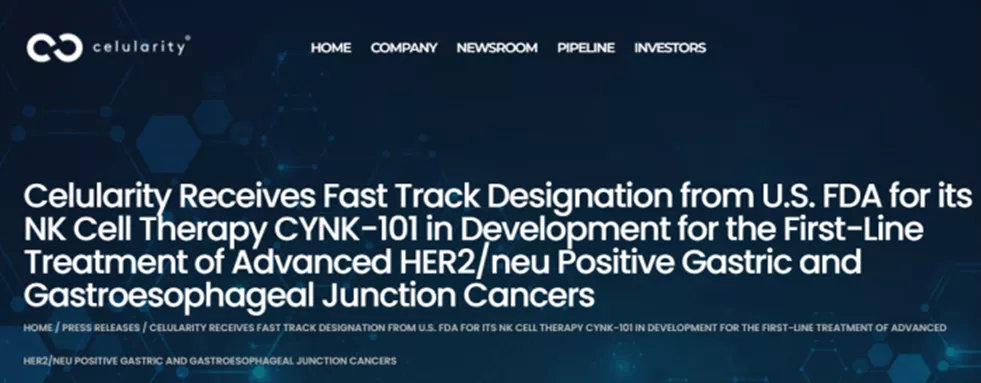Recently, the U.S. FDA granted placental-derived cell therapy CYNK-101 Fast Track Qualification (FTD) for first-line treatment in patients with advanced HER2/neu-positive gastric or gastroesophageal junction (G/GEJ) adenocarcinoma. CYNK-101 therapy is a genetically modified NK cell therapy derived from allogeneic human placental hematopoietic stem cells [1].

Previously, CYNK-001, an ungenerically modified NK cell therapy derived from allogeneic human placental hematopoietic stem cells, was twice granted FDA Fast Track qualification (FTD) for the treatment of acute myeloid leukemia and recurrent polymorphic glioblastoma, respectively.
In recent years, placental-derived cells, including stem cells and immune cells, have shown great potential in the treatment of a variety of diseases and are gradually gaining recognition. Today we will take a look at the treatment of placental-derived cells and diseases.
Treatment of placental-derived immune cells and diseases
01
NK cells
NK cells are important innate immune cells with antiviral, anti-tumor, and immunomodulatory functions. Unlike acquired immune cells such as T cells and B cells, NK cells can quickly and directly kill target cells without antigen presensitization, so it has become a valuable tool in immunotherapy. The placenta is one of the important sources of NK cells.
The approved CYNK-101 therapy is a gene-modified natural killer (NK) cell therapy in a study that expresses high-affinity and cleavage-resistant CD16 (FCGRIIIA) variants after gene modification, in combination with approved antibody therapies to enhance the antibody-dependent cell-mediated cytotoxicity (ADCC) of NK cells. The Phase 1/2a clinical trial will evaluate the safety and preliminary efficacy of CYNK-101 in combination with standard chemotherapy, trastuzumab, and pebrazumab in the treatment of first-line advanced HER2/neu positive gastric cancer and gastroesophageal junction adenocarcinoma[1].
Another CYNK-001 therapy, ungen-modified NK cell therapy, is currently undergoing clinical trials in multiple myeloma (NCT04309084) and covid-19 (NCT04365101) in addition to fda fast-track qualifications for the treatment of acute myeloid leukemia and recurrent polymorphic glioblastoma [2].
02
T cells
T cells in the placenta have also recently become a major research hotspot, and Celularity's product, cryopreserved chimeric antigen receptor T cells (CyCART), uses human allotopic placental T cells, modifies them with genetic engineering, and can express an artificial T cell receptor (i.e., CAR) on its surface, in addition, knocking out endogenous T cell receptors (TCR).
Unlike adult peripheral blood mononuclear cell-derived T cells, placental-derived CAR-T cells are mostly naïve, easily expand in vitro, express markers of stem cell memory, and are not easily exhausted, thus giving these cells greater proliferative potential in vivo. Placental-derived CAR-T cells have previously been shown to exhibit strong antitumor activity both in vitro and in vivo[3].
Treatment of placental-derived stem cells and diseases
Stem cells in the placenta are rich in content, easy to extract, have similar functions to stem cells from other sources, and have low immunogenicity, which can be used by allogenes. Therefore, stem cells in the placenta have become one of the important sources of stem cells in recent years. On the National Institutes of Health's largest clinical trials registry http://clinicaltrials.gov website we found that there are currently 54 clinically registered treatments related to placental stem cells. Among them we can see that placental stem cells are one of the cells that have received widespread attention.
Placental mesenchymal stem cells have been used in the treatment of a variety of diseases, and in the treatment of acute liver failure, the study found that:
1. Placental mesenchymal stem cells have the potential to differentiate into hepatocyte-like cells in vivo and in vitro, and can also differentiate into vascular cells and pericyte cells, thereby improving liver damage;
2. Placental mesenchymal stem cells are recruited to the liver injured area, and the remaining liver cells are affected by cell-to-cell contact and secretion of transforming growth factor-α (TGF-α), hepatocyte growth factor (HGF) and vascular endothelial growth factor (VEGF);
3. Placental mesenchymal stem cells have immunomodulatory properties and increase Treg cells, regulate the immune system and inhibit the production of activated T cells, NK cells, B cells and IL-10;
4. Placental mesenchymal stem cells reduce the inflammation of hepatocytes and prevent their apoptosis by inhibiting TNF-α and IFN-γ, and then promote hepatocyte regeneration by releasing HGF, IL-6, PAF and VEGF;
5. Mesenchymal stem cells are able to secrete a variety of angiogenesis factors, including VEGF, SDF-1α, and MMP1, to promote angiogenesis [4].
COVID-19 is currently one of the world's most concerned health concerns, and there are no effective drugs for covid-19 treatment. Recently, researchers have treated five patients with acute respiratory distress syndrome caused by new coronary pneumonia with placental mesenchymal stem cells, and the clinical symptoms, serum cytokine levels, and imaging assessments of patients after treatment have improved significantly compared with before.
Expectation: Placental-derived cells guard health
Today, the placenta is no longer a "medical waste" after the baby is born, and scientists have found that the placenta is a huge treasure trove, and the cells in it, such as immune cells and stem cells, have the potential to be used in the treatment of many diseases. Therefore, the storage and utilization of placental source cells will become a hot spot in the future, and families can choose to store postpartum placental stem cells for later use by babies and other members of the family for disease treatment.
bibliography:
[1]https://celularity.com/celularity-receives-fast-track-designation-from-u-s-fda-for-its-nk-cell-therapy-cynk-101/
[2]https://celularity.com/nk-cell-platform/
[3]https://celularity.com/t-cell-platform/
[4] Saleh M, Taher M, Sohrabpour AA, Vaezi AA, Nasiri Toosi M, Kavianpour M, Ghazvinian Z, Abdolahi S, Verdi J. Perspective of placenta derived mesenchymal stem cells in acute liver failure. Cell Biosci. 2020 May 24;10:71.
https://pubmed.ncbi.nlm.nih.gov/32483484/
[5] Hashemian SR, Aliannejad R, Zarrabi M, Soleimani M, Vosough M, Hosseini SE, Hossieni H, Keshel SH, Naderpour Z, Hajizadeh-Saffar E, Shajareh E, Jamaati H, Soufi-Zomorrod M, Khavandgar N, Alemi H, Karimi A, Pak N, Rouzbahani NH, Nouri M, Sorouri M, Kashani L, Madani H, Aghdami N, Vasei M, Baharvand H. Mesenchymal stem cells derived from perinatal tissues for treatment of critically ill COVID-19-induced ARDS patients: a case series. Stem Cell Res Ther. 2021 Jan 29;12(1):91.
https://pubmed.ncbi.nlm.nih.gov/33514427/